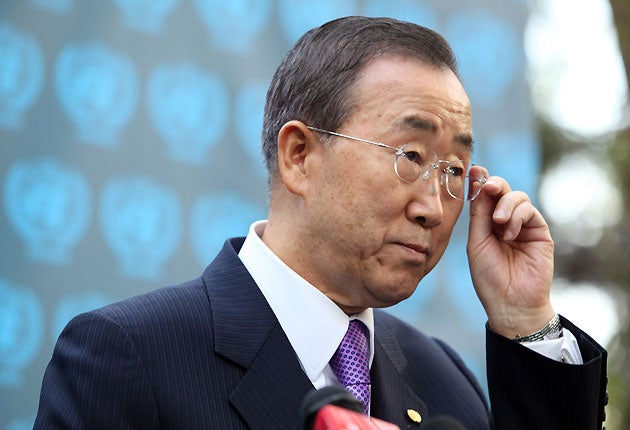Giant climate deal is too little says UN chief

The giant cash deal to save the planet – proposed by Europe for the forthcoming Copenhagen climate conference – will not be enough, the UN Secretary General, Ban Ki-Moon, said today.
The public-money fund of up to €50bn annually, which the European Union suggested would be adequate to help developing nations protect themselves from global warming, and cut back on their own carbon emissions, would need to be “scaled up”, Mr Ban said.
His remarks threw into sharp relief the vast scale of new financial aid from the rich to the poor countries which will be necessary to secure a new international climate change treaty in the Danish capital next month. There is already a colossal divergence between what the poorer, developing countries say is necessary, and what the rich developed countries are prepared to pay – which could lead to a deal breaking down.
On a flying visit to London, the Secretary General said that the package agreed by the EU on Friday, which envisaged a total annual climate fund of €100bn, the public finance element of which should be €22bn to €50bn, “could be a good start”.
It would help to bridge the gap in confidence and trust between the developed and the developing nations, he said. But he added: “It needs to be scaled up as we go.”
Europe’s proposals, made at Friday’s council of EU leaders, including Gordon Brown, are vitally important for the Copenhagen meeting, which begins on 7 December, as they are the only figures so far on the table from the rich world for the financial arrangement which will be a key part of any new climate change pact. Europe itself would probably pay between €5bn and €12bn of the 22-to-50 total, with Britain’s share being about €1bn.
It is accepted on all sides that the rich nations, responsible for most of the carbon dioxide which has gone into the atmosphere over the last 200 years, will have to find substantial sums to help the developing countries map out a new low-carbon growth path, and adapt to the effects of climate change which is now unavoidable. But there is a big difference of opinion on what the figures should be.
The developing countries themselves have proposed that the new financial flows should be between 0.5 and 1 per cent of the rich countries’ GDP, which could be anything up to $400bn – about £250bn annually.
Europe’s more modest (but still enormous) figure put forward on Friday thus leaves a very big gap which officials from 192 countries are trying to bridge this week in Barcelona, in the final week-long session of pre-Copenhagen negotiations. Mr Ban’s intervention, stating unequivocally that the EU figures are too low, ups the ante in the talks considerably.
However, one senior European official said he thought it was unlikely that the EU offer could be substantially revised upwards. “This is what the EU has decided its taxpayers can afford and a final deal will have to be of this order,” he said.
Mr Moon said the Copenhagen meeting would be a success if it included four elements: ambitious mid-term targets for developed countries to reduce their greenhouse gas emissions, coupled with equally ambitious actions from the developing countries to cut their own CO2; a strong deal to help poor states adapt to the effects of the coming warming; substantial financial support for developing countries; and equitable governance structures for all the new arrangements.
But he issued a word of caution, saying that the Copenhagen meeting “might not be the final word on all these matters”.
He said: “I am not lowering the bar.” But he thought that the meeting would be a success if it could produce a politically-binding agreement, rather than a new legally-binding treaty.
“If we agree a binding political commitment, that would be a reasonable success,” he said. “Then post-Copenhagen negotiations should continue until we have a legally-binding agreement as soon as possible.”
Join our commenting forum
Join thought-provoking conversations, follow other Independent readers and see their replies
Comments
Bookmark popover
Removed from bookmarks